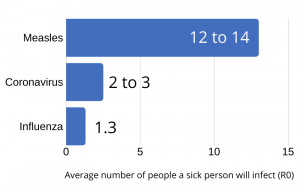Every word has a story. The story of the word “quarantine” began in the city of Venice in 1347 as the disaster that would kill more people than any other natural disaster that the world has ever known, the Black Death, was about to begin.
When the Black Death was finally over four years later, somewhere between 30 and 60% of the people who had been living in Europe were dead! [1]
But, in 1351, no one was sure what caused the Black Death; they only knew that it was spread by travelers.
The city of Venice had to act. Their first act was to isolate visitors who arrived in Venice by ship to small, nearby islands for thirty days to see if symptoms of the Black Death would develop. If you were still healthy after 30 days, they would let you into Venice.
Unfortunately, thirty days wasn’t enough time to prove you didn’t have a hidden case of the Black Death, so they increased the required isolation time from thirty days to forty days. [2]
And the Black Death finally stopped.
The Italian Word for Forty
The Italian word for forty is “quaranta” and so, the practice of isolating visitors who might have a disease, or isolating yourself from visitors who might have a disease, came to be called a “Quarantine.” [3]
Quarantines have a very long history of stopping epidemics.
How A Self-Quarantine Can Keep You From Getting Coronavirus
For any new disease, like the Black Death in 1347 or the Coronavirus today, the incubation period, or the time between contracting a disease and unknowingly infecting others and when you show symptoms, is something that no one is exactly sure of.
While many people who get Coronavirus start to feel sick after four or five days, some people can feel fine for two weeks or longer. During this entire incubation period, they are unwillingly and unknowingly spreading the disease.
One case was reported of a child who looked good, didn’t have a fever, and felt perfectly fine, but who tested positive for the COVID-19 virus for 26 days. [4]
In the times of the Black Death, the Venetian government initially thought that thirty days was long enough. They were wrong. Most people today think that a two-week quarantine will be long enough to prove that you don’t have Coronavirus, but they may be wrong, too.
Yes, you should definitely wash your hands more often, stop touching your face, and avoid crowds “like the plague.” However, you should also prepare to do the only thing that has an over 500-year track record of success: a long quarantine.
How long you need to be prepared to isolate yourself is currently unknown, but the Black Death kept going for four years before it ended[1] and the 1918 Spanish flue killed people for two years before it was over.[5] So, you need to be physically and mentally prepared for something that might last much longer than most people would expect.
Based on recent Chinese experience, a good first guess would be to prepare for a twelve-week quarantine.
History Repeats Itself
In a strange twist of fate, on March 8, 2020, the Italian city of Venice, the city that gave us the word “quarantine” to begin with, was, once again, put under quarantine. The next day, on March 9, 2020, all of Italy was put under quarantine.[6]
How to Start an Epidemic
I’m an engineer with a degree in Aeronautical and Astronautical Engineering from the University of Illinois, so I understand the math of epidemics.
So, here’s a simple explanation of how epidemics happen.
To start an epidemic, a sick person needs to spread his disease to more than one other person. The average number of people that a sick person spreads his disease to is written as R0, pronounced “R naught.”
The typical winter time flu has an R0 of 1.3, which means that each sick person passes the flu on to an average of 1.3 other people.[7] This is bad enough to give a lot of people the flu every winter, but not bad enough to give everyone the flu.

While the Coronavirus spreads more easily than the flu, it’s not nearly as contagious as the Measles.
Unfortunately, Coronavirus is more contagious. It has an R0 of between 2 and 3, so each sick person gives the disease to somewhere between 2 and 3 people.
While Coronavirus is worse than the usual wintertime flu, the tiny bit of good news is that Coronavirus is not nearly as infectious as it could be. Measles, for example, has an R0 of 12 to 14.[8]
How to Stop an Epidemic
To stop an epidemic, you have to reduce R0 to below 1.0. By doing this, the epidemic will eventually fade out as people who currently have the disease either recover or die and each sick person passes on the disease to fewer than one other person.[9]
In the long-term, scientists can hopefully develop vaccines to prevent it but, in the short-term, since this is a new virus that no one has immunity to, every handshake, every kiss, every hug, and every touch of a sneezed-on surface spreads the virus.
Since we can’t change the virus, and we can’t quickly change our immunity to it, we have to do the only other thing that is proven to work: quarantines.
As of this writing, China apparently has their epidemic under control by quarantining over 55 million people in Hubei province. China’s quarantine is a real quarantine where no one goes in and no one goes out of their building. It’s not fun for anyone, but it’s very effective.
Your Job is to Delay Getting Coronavirus
The current best estimate from Harvard epidemiologist Mark Lipsitch is that 40 to 70 percent of the world’s population will be infected by the Coronavirus. [10]
What seems likely is that, within twelve months, treatment techniques will be developed that make Coronavirus a much less deadly disease than it is right now.
Don’t Panic — Do Prepare Carefully
If you are wise enough to already have an emergency supply of your food in your house, this is the time to stay home and use it.
Don’t go to church, don’t go to school, don’t go to sports events, and avoid any public gathering whether large or small. Stay home if you are even slightly unwell. If you have a job where you meet a lot of people, change either your work or the way you work so that you don’t come into contact with a lot of people.
For some people, it may even be safer to quit work and retire.
If you must shop for supplies, shop at times when only a few people will be in the store.
If you are completely unprepared now, try to get at least somewhat prepared for a period of voluntary quarantine.
In Some Cultures — Forty Doesn’t Mean Forty
In middle eastern cultures of both ancient times and today, the word “forty” is often used to mean some really big number that you aren’t exactly sure of. In the Bible, for instance, it says that Jesus fasted for forty days in the desert. Did Jesus fast for exactly forty days? Who knows, but he fasted for a long time. [11]
Do you know the story of Ali Baba and the Forty Thieves? Was Ali Baba fighting with exactly forty thieves? Who knows, but there were a lot of thieves. [12]
So, how long should you be prepared to quarantine yourself? Who knows exactly, but it could be longer than anyone would expect.
After You Are Prepared
After you are prepared for a likely quarantine, you may want to do something productive with your time at home like learning Italian.
References:
1. Wikipedia contributors. Black Death. In Wikipedia, The Free Encyclopedia. Retrieved March 14, 2020, from https://en.wikipedia.org/wiki/Black_Death
2. Wikipedia contributors. Quarantine. In Wikipedia, The Free Encyclopedia. Retrieved March 14, 2020, from https://en.wikipedia.org/wiki/Quarantine
3. Online Etymology Dictionary. Retrieved March 14, 2020 from https://www.etymonline.com/word/quarantine
4. Zhoushan Center for Disease Control and Prevention. (2020, March 9). “Detection of Novel Coronavirus by RT-PCR in Stool Specimen from Asymptomatic Child.” Retrieved March 14, 2020 from https://wwwnc.cdc.gov/eid/article/26/6/20-0301_article
5. Billings, Molly. (2005). “The Influenza Epidemic of 1918.” Retrieved March 14, 2020 from https://virus.stanford.edu/uda/
6. Ankel, Sophia. (2020, March 10). “Italy has put all its 60 million people under lockdown. Here’s what it looks like on the ground.” Business Insider. Retrieved March 14, 2020 from https://www.businessinsider.com/coronavirus-photos-show-what-italy-looks-like-under-complete-lockdown-2020-3
7. Biggerstaff, M., Cauchemez, S., Finelli, L., Gambhir, M., Reed, C. (2014, September 4). “Estimates of the reproduction number for seasonal, pandemic, and zoonotic influenza: a systematic review of literature.” BMC Infectious Diseases. Retrieved March 14, 2020 from https://www.ncbi.nlm.nih.gov/pubmed/25186370
8. Eisenberg, J. (2020, February 12). “R0: How Scientists Quantify the Intensity of an Outbreak like Coronavirus and its Pandemic Potential.” University of Michigan, School of Public Health. Retrieved March 14, 2020 from https://sph.umich.edu/pursuit/2020posts/how-scientists-quantify-outbreaks.html
9. Jones, JH. (2007, May 1). “Notes on R0.” Stanford University, Department of Anthropological Sciences. Retrieved on March 14, 2020 from https://web.stanford.edu/~jhj1/teachingdocs/Jones-on-R0.pdf
10. Center for Disease Control and Prevention YouTube Channel. (2020, March 2). “Epidemiologist predicts effects of coronavirus in the months ahead.” Retrieved on March 14, 2020 from https://www.youtube.com/watch?v=iDelUkpFm60
11. Wikipedia contributors. Temptation of Christ. In Wikipedia, The Free Encyclopedia. Retrieved March 14, 2020, from https://en.wikipedia.org/wiki/Temptation_of_Christ
12. Wikipedia contributors. Ali Baba and the Forty Thieves. In Wikipedia, The Free Encyclopedia. Retrieved March 14, 2020, from https://en.wikipedia.org/wiki/Ali_Baba_and_the_Forty_Thieves










 Irish
Irish

